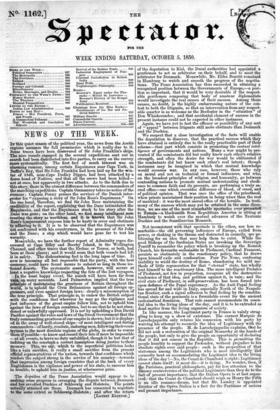NEWS OF THE WEEK.
tm
Esquimaux, and that the Esqutmaux stuck to his st6a after the Dane was gone ; on the other hand, we find many in ' t men treating the story as worthless, and it is known that it John -Ross's temperament exposes him to be hasty in error and obstinate -in adhering to it. It is to be observed that the Esquimaux was not confronted with his countrymen, in the presence of Sir John and the Dane; a step which would have gone far to test his veracity. Meanwhile, we have the further report of Admiralty ropes dis- covered at Cape Riley and Beeehy Island, in the Wellington Channel, and other traces that the Erebus or Terror, or both, had been at those places; and it would seem that both vessels had left it in safety. The disheartening fact is the long lapse of time. It now is becoming all but impossible that the party, with the best economy, could have found means to subsist so long in those ice- bound deserts. The systematic search, however, will secure at least a negative knowledge respecting the fate of the lost voyagers.
In the least happy event, the search will have been far from vain, on many accounts. Lord Palmerston implied that the true principle of maintaining the greatness of Britain throughout the world, is to uphold the Civis Britannicus against all foreign op- pressors, and even against foreign laws : clearly a misconception of the true principle. That principle is, to endow the British subject with the confidence that wherever he may go the vigilance and just influence of the great empire follow him, not to uphold him against the laws of foreign countries, but to see that he be not aban- doned or unlawfully oppressed. It is not by upholding a Don David Pacifico against the rules and laws of the Greek Government that the truly commanding greatness of our empire is shown; but it is display- ed in the array of well-stored ships—of most intelligent and daring commanders—of hardy, resolute, enduring men, followingtheir coun- trymen to the most desolate regions of the globe, in order to rescue them if possible--to know and record their fate if more be impossible —at all events, to leave no duty unfulfilled, though it be but that of inditing on the cenotaph a correct inscription doing justice to their memory. This, we say, which to the superficial politician looks like a vain sacrifice, is really a small sacrifice from the present official representatives of the nation, towards that confidence which renders the subject strong in the service of his country—towards that impression among. foreign countries that at the back of every Englishman is the vigilance and power of his state, to succour him in trouble, to uphold him in justice, at whatsoever price.


























